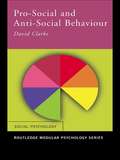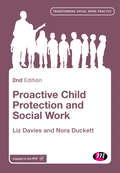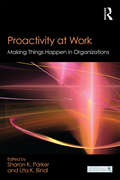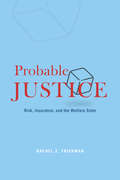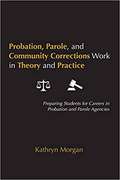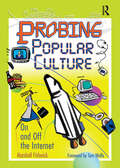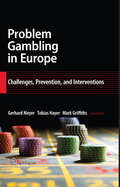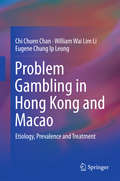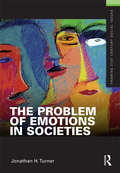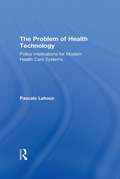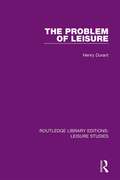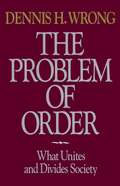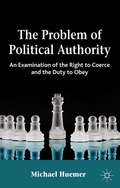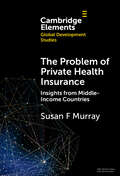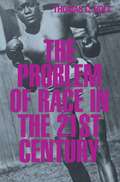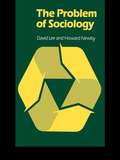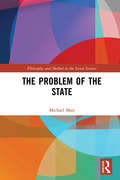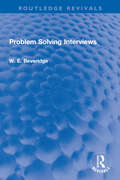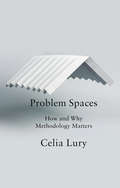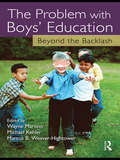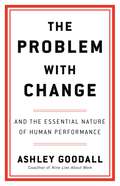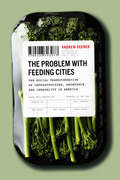- Table View
- List View
Pro-Social and Anti-Social Behaviour (Routledge Modular Psychology)
by David ClarkePro-Social and Anti-Social Behaviour describes the nature and causes of pro-social and anti-social behaviour. It is an introductory level text aimed at students new to this area of Social Psychology. Topics covered include social psychological theories of aggression, altruism and bystander behaviour, and media influences on pro- and anti-social behaviour. Each section includes information on research carried out in these areas of study.
Pro-Sumer Power II! How to Create Wealth by Being Smarter, Not Cheaper, and Referring Others to Do the Same
by Bill QuainAccording to marketing expert Dr. Bill Quain, average people can produce above-average wealth through the power of pro-suming. Pro-sumer Power! is a must read for people who would love to create income - instead of "out-go" - when they shop.
Proactive Child Protection and Social Work (Transforming Social Work Practice Series)
by Nora Duckett Liz DaviesProtecting children from abuse and neglect is a serious and complex area of social work practice and understanding the critical skills of communicating with and listening to children's voices, and those of their advocates and survivors, is essential. In this new edition of a highly-regarded book, the authors offer a strengthened children's rights perspective and explore four main categories of child abuse - emotional abuse, sexual abuse, neglect and physical abuse. The book also considers legal safeguards and protective processes to increase the creativity and confidence of those undertaking such work. Locating knowledge and skills within a series of case examples from real life practice and serious case reviews, this book is an indispensable resource for students, professionals and others concerned with protecting children. This second edition has been comprehensively revised and updated to include current research evidence and a focus on the neglected protection needs of sexually exploited young people, children in custody, disabled children, young carers and unaccompanied child migrants.
Proactivity at Work: Making Things Happen in Organizations (Organization and Management Series)
by Sharon K. Parker Uta K. BindlAs organizations grow increasingly complex and unpredictable, the topic of proactivity at work has become of great importance for contemporary workplaces. Proactivity drives performance and innovation of teams and organizations and boosts individuals’ well-being and careers. When individuals are proactive, they use their initiative at work to bring about a better future. They scan for opportunities, persist until change is achieved, and take charge to prevent problems’ future reoccurrence. In this book, leading scholars on proactivity from across North America, Europe, Asia, and Australia explore how, why, and when individuals are motivated to initiate change within their organizations or themselves and examine the consequences of various forms of proactivity at work. Individual chapters explore specific concepts of proactivity, such as proactive voice, job crafting, and career proactivity, as well as highlight individual processes and organizational dynamics that underlie successful proactivity at work. By providing insights on key advances and future directions for proactivity theory, research, and practice, Proactivity at Work synthesizes what we already know and identifies what we still need to learn about making things happen at work. This book is relevant to all those involved or interested in Work Psychology and Business, including Human Resource Management scholars.
Probability and Forensic Evidence: Theory, Philosophy, and Applications
by Ronald Meester Klaas SlootenThis book addresses the role of statistics and probability in the evaluation of forensic evidence, including both theoretical issues and applications in legal contexts. It discusses what evidence is and how it can be quantified, how it should be understood, and how it is applied (and, sometimes, misapplied). After laying out their philosophical position, the authors begin with a detailed study of the likelihood ratio. Following this grounding, they discuss applications of the likelihood ratio to forensic questions, in the abstract and in concrete cases. The analysis of DNA evidence in particular is treated in great detail. Later chapters concern Bayesian networks, frequentist approaches to evidence, the use of belief functions, and the thorny subject of database searches and familial searching. Finally, the authors provide commentary on various recommendation reports for forensic science. Written to be accessible to a wide audience of applied mathematicians, forensic scientists, and scientifically-oriented legal scholars, this book is a must-read for all those interested in the mathematical and philosophical foundations of evidence and belief.
Probable Justice: Risk, Insurance, and the Welfare State
by Rachel Z. FriedmanDecades into its existence as a foundational aspect of modern political and economic life, the welfare state has become a political cudgel, used to assign blame for ballooning national debt and tout the need for personal responsibility. At the same time, it affects nearly every citizen and permeates daily life—in the form of pension, disability, and unemployment benefits, healthcare and parental leave policies, and more. At the core of that disjunction is the question of how we as a society decide who should get what benefits—and how much we are willing to pay to do so. Probable Justice traces a history of social insurance from the eighteenth century to today, from the earliest ideas of social accountability through the advanced welfare state of collective responsibility and risk. At the heart of Rachel Z. Friedman’s investigation is a study of how probability theory allows social insurance systems to flexibly measure risk and distribute coverage. The political genius of social insurance, Friedman shows, is that it allows for various accommodations of needs, risks, financing, and political aims—and thereby promotes security and fairness for citizens of liberal democracies.
Probation, Parole, and Community Corrections Work in Theory and Practice: Preparing Students for Careers in Probation and Parole Agencies
by Kathryn MorganProbation, Parole, and Community Corrections Work in Theory and Practice is a comprehensive examination of probation, parole, and other correctional practices that are alternatives to incarceration. The textbook covers important topics related to community corrections, including an overview of correctional programs used as alternatives to incarceration (probation, parole, home confinement, and electronic monitoring); the history and development of community correctional practices; current controversies; and legal issues affecting probation, parole, and community correctional practices. <P><P> Critical thinking questions in each chapter along with case studies and case scenarios reflect the book’s balanced approach to examining community corrections. The emphasis on developing problem solving, report writing, and critical thinking skills makes this book an excellent choice for students who desire to enter the field. Students completing a course using this book will have not only an understanding of the dynamic forces of community corrections but also the skill competence that prepares them for entry-level positions in community corrections agencies.
Probing Popular Culture: On and Off the Internet
by Marshall Fishwick"When it comes to seeing depth and lateral connections in the development of popular culture, nobody exceeds Marshall Fishwick." -Canadian Psychology In Probing Popular Culture: On and Off the Internet, one of the leading authorities in American and popular culture studies presents an eye-opening examination o
Problem Gambling in Europe
by Gerhard Meyer Tobias Hayer Mark GriffithsProblem Gambling in Europe Challenges, Prevention, and Interventions Edited by Gerhard Meyer, University of Bremen, Germany Tobias Hayer, University of Bremen, Germany Mark Griffiths, Nottingham Trent University, United Kingdom As a leisure activity, gambling dates back to ancient times. More recently, the surge in avenues for gambling--casinos, sports betting, lotteries, and remote media (e.g.,Internet, mobile phone, interactive television) among them--finds growing numbers of people losing control over their gambling behaviour, usually at great personal and financial expense. Problem Gambling in Europe is the first book to offer a robust international knowledge base compiled by an interdisciplinary panel of researchers in gambling behaviour. Reports from 21 countries throughout Western, Eastern, Northern, and Southern Europe reveal wide variations in types of wagering activities, participation by populations, social and criminal consequences related to pathological gambling, the extent to which governments acknowledge the problem, and efforts to control it (often with the involvement of the gaming industries). For each country, noted experts discuss: Current legislation regulating gambling. Forms of gambling and their addictive potential. Participation rates and demographics. Prevalence of pathological gambling. National policies to address problem gambling. Prevention strategies and treatment methods. Problem Gambling in Europe brings insight and clarity to a widespread and complex phenomenon, and will be of considerable interest to all parties working to reduce their negative effects: social science researchers in addictions, gambling behaviour, and public health; clinical, social, and health psychologists and psychiatrists; treatment practitioners; the gaming industry; regulators; and policy makers.
Problem Gambling in Hong Kong and Macao
by Chi Chuen Chan William Wai Lim Li Eugene Chung Ip LeungThis book critically examines the psychology of gambling in Hong Kong and Macao. Covering the history of gambling and its development in the two jurisdictions, it highlights the prevalence and status quo of problem gambling, the theoretical perspectives on the etiology of gambling disorder, and the treatment of problem gambling. The book also introduces a personality and pathways development model of Chinese problem gamblers and concludes with outlooks on the future of gambling in Hong Kong and Macao.
The Problem of Emotions in Societies (Framing 21st Century Social Issues)
by Jonathan TurnerLike any other valued resource, emotions are distributed unequally. Moreover, emotions are a generalized resource because they give people the confidence, or lack of confidence, to secure additional types of resources. Thus, this distribution of emotions roughly corresponds to the shares of others kinds of resources that members of various social classes possess. The level of positive and negative emotional energy evident among members of different social classes has large consequences for the viability of human societies. When a large majority of members in diverse social classes have reservoirs of positive emotional energy, these emotions work to legitimate macrostructures and to build people’s commitments to societies. When, however, significant numbers of persons in lower social classes, and at times in middle to upper social classes as well, reveal reservoirs of negative emotional energy, they are likely to de-legitimate key institutional systems and, under specifiable conditions, mobilize collective—often with violent outcomes. Thus, emotions are at the core of both integrative and disintegrative forces in societies, and when large reservoirs of negative emotional energy exist, they pose a problem for societies. The goal of this new, unique Series is to offer readable, teachable "thinking frames" on today’s social problems and social issues by leading scholars, all in short 60 page or shorter formats, and available for view on http://routledge.customgateway.com/routledge-social-issues.html For instructors teaching a wide range of courses in the social sciences, the Routledge Social Issues Collection now offers the best of both worlds: originally written short texts that provide "overviews" to important social issues as well as teachable excerpts from larger works previously published by Routledge and other presses.
The Problem of Health Technology: Policy Implications For Modern Health Care Systems
by Pascale LehouxHealth technology is a pivotal locus of change and controversy in health care systems, and The Problem of Health Technology offers a comprehensive and novel analysis of the topic. The book illuminates the scientific and policy arguments that are currently deployed in industrialized countries by addressing the perspectives of clinicians, health care managers, scholars, policymakers, patients, and industry. And by establishing a dialogue between two interdisciplinary fields--Health Technology Assessment and Science and Technology Studies--Pascale Lehoux argues for re-centering the debate around social and political questions rather than questions of affordability, thereby developing an alternative framework for thinking about the implications of health technology.
The Problem of Leisure (Routledge Library Editions: Leisure Studies)
by Henry DurantFirst published in 1938. This study examines various aspects of leisure in the early twentieth century. The author observes the differences in leisure between the various echelons of society, as well as the differences of leisure amongst children and adults. Durant also explores in depth several modes of leisure, including the cinema, sport, and gambling. This title will be of interest to students of history, sociology, and leisure studies.
Problem of Order: What Unites and Divides Society
by Dennis Wrongtwentieth century, many fear that the bonds holding civil society together have come undone. Yet, as the noted scholar Dennis Wrong shows us, our generation is not alone in fearing a breakdown of social ties and a descent into violent conflict. Modern masters such as Hobbes, Rousseau, Freud, Mead, Parsons, Marx, Durkheim, and Weber tried to understand what in human nature provokes social cooperation and solidarity and what arouses conflict and chaos. To minimize discord and promote civility, society must grasp the psychological and sociological elements of human nature involved in attaining that end. The author affords an illuminating perspective on our own efforts to create a well-functioning system that allows for productive and meaningful lives and remains open to change and growth. This important book reveals the individual and social processes that offer potential for reconciliation in the present and the future.
The Problem of Political Authority
by Michael HuemerThe state is often ascribed a special sort of authority, one that obliges citizens to obey its commands and entitles the state to enforce those commands through threats of violence. This book argues that this notion is a moral illusion: no one has ever possessed that sort of authority.
The Problem of Private Health Insurance: Insights from Middle-Income Countries (Elements in Global Development Studies)
by null Susan F. MurrayFinancial markets, actors, institutions and technologies are increasingly determining which kinds of services and 'welfare' are available, how these are narrated, and what comes to represent the 'common sense' in the policy world and in everyday life. This Element problematises the rationale and operation of one such financial technology, private health insurance, and the industry it inhabits. It offers a cross-disciplinary overview of the various drivers of these markets in middle-income countries and their appeal for development institutions and for governments. Using a range of illustrative case examples and drawing on critical scholarship it considers how new markets are pursued and how states are entangled with market development. It reflects on how the private health insurance sector in turn is shaping and segmenting health systems, and also our ideas about rights, fairness and responsibility.
The Problem of Race in the Twenty-First Century
by Thomas C. HoltThis brief book speaks powerfully to the question of how the circumstances of race and racism have changed in our time--and how these changes will affect our future. Foremost among the book's concerns are the contradictions and incoherence of a system that idealizes black celebrities in politics, popular culture, and sports even as it diminishes the average African-American citizen. The world of the assembly line, boxer Jack Johnson's career, and The Birth of a Nation come under Holt's scrutiny as he relates the malign progress of race and racism to the loss of industrial jobs and the rise of our modern consumer society. Understanding race as ideology, he describes the processes of consumerism and commodification that have transformed, but not necessarily improved, the place of black citizens in our society. As disturbing as it is enlightening, this timely work reveals the radical nature of change as it relates to race and its cultural phenomena. It offers conceptual tools and a new way to think and talk about racism as social reality.
The Problem of Sociology
by David Lee Howard NewbyFirst Published in 1983. Routledge is an imprint of Taylor & Francis, an informa company.
The Problem of the State (Philosophy and Method in the Social Sciences)
by Michael MairThe Problem of the State provides a new perspective on what the social and political sciences can contribute to understandings of the state and the ambivalent place it occupies in our collective affairs. Distinguishing two broad conceptual and methodological approaches to addressing the problem of how to study the state empirically rather than theoretically - the constitutionalist and constructionist positions – the author reviews the grounds and limits of both to reveal their common assumption: that it is up to the social and political sciences to define what the problem of the state is. Building on insights from Marx, Wittgenstein and Ethnomethodology, this book frees the study of the state from the limiting assumptions of common approaches and advocates a return of the problem to its proper environment, in social and political practice.
Problem Solving Interviews (Routledge Revivals)
by W. E. BeveridgeFirst published in 1968, Problem Solving Interviews explores different elements relating to conversations concerned with finding a solution to a particular problem. The book begins first by examining the role of the problem-solving interviewer, before exploring in detail what an interview is. It looks at the significance of different attitudes in shaping behaviour and highlights the importance of considering the attitudes of both the interviewer and the respondent. This leads on to a consideration of bias, including where it comes from, how it can affect the interview, and whether its impact can be eliminated or reduced. The book also covers carrying out and learning how to interview, and includes close analysis of three example interviews.
Problem Spaces: How and Why Methodology Matters
by Celia LuryIn this innovative book, Celia Lury argues that the time has come for us to explore the world not only with new methods, but with a new approach to methodology itself. Fundamental changes are taking place in how we produce knowledge, how we communicate it and, indeed, what we consider to be knowledge. These changes demand innovative and creative responses to research questions. Lury's rethinking of the nature of social inquiry starts by reconceptualizing the 'problem space'. Problems are not static or a 'given'; rather, they are created and continually recomposed as part of the methodological process itself. Following the line of thought that methods are practices that articulate as much as capture a social problem, Lury further develops the notion of compositional methodology to think through its implications. With remarkable fluency, the book draws into conversation a range of hot-button issues, both longstanding and novel, from observation, reflexivity, recursive measurement and feminist methodologies, to participation, context, datafication and platformization. Always with an eye to the methodological potential of new trends, the book provides a strong challenge to much received wisdom and argues that a combination of techniques can contribute to better understanding of the problem spaces we all inhabit.
The Problem with Boys' Education: Beyond the Backlash
by Wayne Martino Michael Kehler Marcus B. Weaver-HightowerThis book offers an illuminating analysis of the theories, politics, and realities of boys’ education around the world -- an insightful and often disturbing account of various educational systems’ successes and failings in fostering intellectual and social growth in male students. Examining original research on the impact of implementing boys’ education programs in schools, the book also discusses the role of male teachers in educating boys, strategies for aiding marginalized boys in the classroom, and the possibilities for gender reform in schools that begins at the level of pedagogy. Complete with case studies of various classrooms, school districts, and governmental policy programs, the detailed essays collected provide a look into education’s role in the development of masculinities, paying special attention to the ways in which these masculinities intersect with race, class, and sexuality to complicate the experience of boys within and outside of a classroom setting.
The Problem with Change: And the Essential Nature of Human Performance
by Ashley GoodallIf you&’ve had enough of the constant turbulence that defines corporate life today, you&’re not alone. Learn why change is bad for people and for business, and discover how to create the stability that we all need to thrive. For decades, &“disruption&” and &“change&” have been seen as essential to business growth and success. In this provocative and incisive book, leadership expert Ashley Goodall argues that what has become a sacred dogma is both wrong and harmful. Whether it&’s a merger or re-org or a new office layout, change has become the ultimate easy button for leaders, who pursue it with abandon, unleashing a torrent of disruption on employees. The result is what Goodall calls &“life in the blender&”—a perpetual cycle of upheaval, uncertainty, and unease. The problem with change, Goodall argues, is that a culture where everything from people to processes to strategic priorities are constantly in flux exerts a psychological toll that undermines motivation, productivity, and performance. And yet so accustomed are we to constant churn that we have become numb to its very real consequences. Drawing on two decades spent leading HR organizations at Deloitte and Cisco, Ashley Goodall reveals why change is not the same as improvement, and how, by prioritizing team cohesion (instead of reshuffling teams at will), by using real words (rather than corporate-speak), by sharing secrets (not mission statements), by fixing only the things that are truly broken (instead of moving fast and breaking everything in sight, and more, leaders at every level can create the stability that people need to thrive.
The Problem with Feeding Cities: The Social Transformation of Infrastructure, Abundance, and Inequality in America
by Andrew DeenerFor most people, grocery shopping is a mundane activity. Few stop to think about the massive, global infrastructure that makes it possible to buy Chilean grapes in a Philadelphia supermarket in the middle of winter. Yet every piece of food represents an interlocking system of agriculture, manufacturing, shipping, logistics, retailing, and nonprofits that controls what we eat—or don’t. The Problem with Feeding Cities is a sociological and historical examination of how this remarkable network of abundance and convenience came into being over the last century. It looks at how the US food system transformed from feeding communities to feeding the entire nation, and it reveals how a process that was once about fulfilling basic needs became focused on satisfying profit margins. It is also a story of how this system fails to feed people, especially in the creation of food deserts. Andrew Deener shows that problems with food access are the result of infrastructural failings stemming from how markets and cities were developed, how distribution systems were built, and how organizations coordinate the quality and movement of food. He profiles hundreds of people connected through the food chain, from farmers, wholesalers, and supermarket executives, to global shippers, logistics experts, and cold-storage operators, to food bank employees and public health advocates. It is a book that will change the way we see our grocery store trips and will encourage us all to rethink the way we eat in this country.
The Problem with Feeding Cities: The Social Transformation of Infrastructure, Abundance, and Inequality in America
by Andrew DeenerFor most people, grocery shopping is a mundane activity. Few stop to think about the massive, global infrastructure that makes it possible to buy Chilean grapes in a Philadelphia supermarket in the middle of winter. Yet every piece of food represents an interlocking system of agriculture, manufacturing, shipping, logistics, retailing, and nonprofits that controls what we eat—or don’t. The Problem with Feeding Cities is a sociological and historical examination of how this remarkable network of abundance and convenience came into being over the last century. It looks at how the US food system transformed from feeding communities to feeding the entire nation, and it reveals how a process that was once about fulfilling basic needs became focused on satisfying profit margins. It is also a story of how this system fails to feed people, especially in the creation of food deserts. Andrew Deener shows that problems with food access are the result of infrastructural failings stemming from how markets and cities were developed, how distribution systems were built, and how organizations coordinate the quality and movement of food. He profiles hundreds of people connected through the food chain, from farmers, wholesalers, and supermarket executives, to global shippers, logistics experts, and cold-storage operators, to food bank employees and public health advocates. It is a book that will change the way we see our grocery store trips and will encourage us all to rethink the way we eat in this country.
